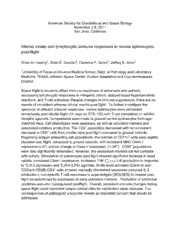
NASA Technical Reports Server (NTRS) 20110015592: Altered Innate and Lymphocytic Immune Responses in Mouse Splenocytes Post-Flight PDF
Preview NASA Technical Reports Server (NTRS) 20110015592: Altered Innate and Lymphocytic Immune Responses in Mouse Splenocytes Post-Flight
American Society for Gravitational and Space Biology November 2-6, 2011 San Jose, California Altered innate and lymphocytic immune responses in mouse splenocytes post-flight Shen-An Hwang1, Brian E. Crucian2, Clarence F. Sams2, Jeffrey K. Actor1 1University of Texas at Houston Medical School, Dept. of Pathology and Laboratory Medicine, 2NASA-Johnson Space Center, Human Adaptation and Countermeasures Division Space flight is known to affect immune responses of astronauts and animals, decreasing lymphocytic responses to mitogenic stimuli, delayed typed hypersensitivity reactions, and T-cell activation. Despite changes in immune suppression, there are no reports of consistent adverse clinical events post flight. To further investigate the spectrum of affected immune responses, murine splenocytes were stimulated immediately post-shuttle flight (14 days on STS-135) with T-cell stimulators or toll-like receptor agonists. Comparisons were made to ground control splenocytes from age- matched mice. Cell phenotypes were assessed, as well as activation markers and associated cytokine production. The CD4+ population decreased with no concurrent decrease in CD8+ cells from shuttle mice post flight compared to ground controls. Regarding antigen presenting cell populations, the number of CD11c+ cells were slightly elevated post flight, compared to ground controls, with increased MHC Class I expression (I-Ab) and no change in Class II expression (H-2Kb). CD86+ populations were also significantly diminished. However, the decreased markers did not correlate with activity. Stimulation of splenocytes post flight showed significant increase in bead uptake, increased Class I expression, increased TNF- and IL-6 production in response to TLR-2 (zymosan) and TLR-4 (LPS) agonists. While most activated (ConA or anti- CD3/anti-CD28) CD4+ cells showed markedly diminished responses (reduced IL-2 production), non-specific T cell responses to superantigen (SEA/SEB) increased post flight as determined by expression of early activation markers. Production of additional cytokines was also dysregulated postflight. Overall, persistent immune changes during space flight could represent unique clinical risks for exploration class missions. The consequences of pathogenic encounter remain an important concern that should be addressed.
